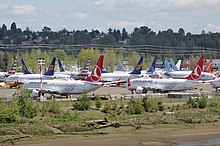
| This article is part of a series about the Boeing 737 MAX |
|---|
|
Accidents
|
The two fatal Boeing 737 MAX crashes in October 2018 and March 2019 which were similar in nature – both aircraft were newly delivered and crashed shortly after takeoff – and the subsequent groundings of the global 737 MAX fleet drew mixed reactions from multiple organizations.
Boeing expressed its sympathy to the relatives of the Lion Air Flight 610 and Ethiopian Airlines Flight 302 crash victims, while simultaneously defending the aircraft against any faults and suggesting the pilots had insufficient training, until rebutted by evidence. After the 737 MAX fleet was globally grounded, starting in China with the Civil Aviation Administration of China the day after the second crash,[1] Boeing provided several outdated return-to-service timelines, the earliest of which was "in the coming weeks" after the second crash. On October 11, 2019, David L. Calhoun replaced Dennis Muilenburg as chairman of Boeing, then succeeded Muilenburg's role as chief executive officer in January 2020.
One year after the crashes, lawmakers demanded answers from then-CEO Dennis Muilenburg in a hearing on Capitol Hill. They questioned him about the discovered mistakes leading to the crashes and also about Boeing's subsequent cover-up efforts. One important line of enquiry was how Boeing "tricked" regulators into approving sub-standard pilot training materials, especially the deletion of mentioning the critical flight stabilization system MCAS.[2] A Texas court ruled in October 2022 that the passengers killed in two 737 MAX crashes are legally considered "crime victims", which has consequences concerning possible remedies.
Airbus articulated that the crashes had been a tragedy and that it would never be good for any competitor to see a particular aircraft type having problems. Airbus reiterated that the 737 MAX grounding and backlog would not change the production volume of the competing Airbus A320neo family as these aircraft had already been sold out through 2025 and logistical and supplier capacities could not be easily enhanced short to medium term in this industry.
Pilots' and flight attendants' opinions were mixed, with some expressing confidence in the certification renewal, while others were increasingly disappointed that Boeing had knowingly concealed the existence and the risks of the newly introduced flight stabilization system MCAS to the 737 series as more and more internal information about the development and certification process came to light. Retired pilot Chesley Sullenberger criticized the aircraft design and certification processes and reasoned that relationship between the industry and its regulators had been too "cozy".
Most airlines sought compensation from Boeing to cover costs of the disruption and refrained from ordering new 737 MAX aircraft, while the International Airlines Group (IAG) announced at the June 2019 Paris Air Show it could order 200 jets but reduced this later to 50 firm orders until 2027.
Opinion polls[citation needed] suggested that most passengers were reluctant to fly again aboard the 737 MAX should it be ungrounded.[citation needed]
- ^ Lahiri, Tripti (March 11, 2019). "China is the first country to ground the Boeing 737 Max after its two crashes". Quartz. Retrieved August 8, 2020.
- ^ Josephs, Leslie (October 29, 2019). "In brutal Senate hearing, Boeing admits its safety assessments of 737 Max fell short". CNBC.